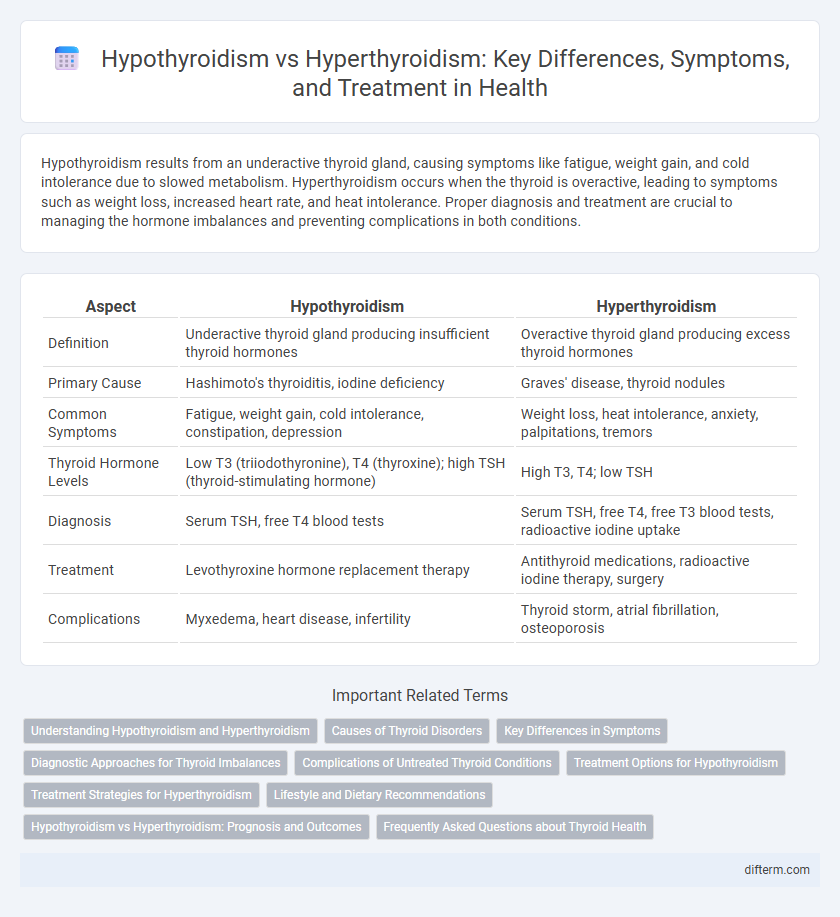Hypothyroidism results from an underactive thyroid gland, causing symptoms like fatigue, weight gain, and cold intolerance due to slowed metabolism. Hyperthyroidism occurs when the thyroid is overactive, leading to symptoms such as weight loss, increased heart rate, and heat intolerance. Proper diagnosis and treatment are crucial to managing the hormone imbalances and preventing complications in both conditions.
Table of Comparison
| Aspect | Hypothyroidism | Hyperthyroidism |
|---|---|---|
| Definition | Underactive thyroid gland producing insufficient thyroid hormones | Overactive thyroid gland producing excess thyroid hormones |
| Primary Cause | Hashimoto's thyroiditis, iodine deficiency | Graves' disease, thyroid nodules |
| Common Symptoms | Fatigue, weight gain, cold intolerance, constipation, depression | Weight loss, heat intolerance, anxiety, palpitations, tremors |
| Thyroid Hormone Levels | Low T3 (triiodothyronine), T4 (thyroxine); high TSH (thyroid-stimulating hormone) | High T3, T4; low TSH |
| Diagnosis | Serum TSH, free T4 blood tests | Serum TSH, free T4, free T3 blood tests, radioactive iodine uptake |
| Treatment | Levothyroxine hormone replacement therapy | Antithyroid medications, radioactive iodine therapy, surgery |
| Complications | Myxedema, heart disease, infertility | Thyroid storm, atrial fibrillation, osteoporosis |
Understanding Hypothyroidism and Hyperthyroidism
Hypothyroidism results from an underactive thyroid gland causing symptoms like fatigue, weight gain, and cold intolerance, while hyperthyroidism stems from an overactive thyroid leading to weight loss, heat intolerance, and nervousness. Both conditions involve imbalances in thyroid hormone production, specifically thyroxine (T4) and triiodothyronine (T3), impacting metabolism regulation. Accurate diagnosis through serum thyroid-stimulating hormone (TSH) and free T4 tests is essential for effective management and treatment of these thyroid disorders.
Causes of Thyroid Disorders
Thyroid disorders arise from various causes, with hypothyroidism often resulting from autoimmune diseases like Hashimoto's thyroiditis, iodine deficiency, or thyroid surgery complications. Hyperthyroidism typically stems from Graves' disease, toxic multinodular goiter, or excessive iodine intake. Genetic predisposition, environmental factors, and certain medications also contribute to the development of both hypothyroidism and hyperthyroidism.
Key Differences in Symptoms
Hypothyroidism typically causes fatigue, weight gain, cold intolerance, and constipation due to decreased thyroid hormone production, whereas hyperthyroidism presents with symptoms like weight loss, heat intolerance, increased appetite, and nervousness from hormone overproduction. In hypothyroidism, patients often experience dry skin and slow heart rate, contrasting with the sweaty skin and rapid heart rate seen in hyperthyroidism. Recognizing these divergent clinical features is crucial for accurate diagnosis and effective management of thyroid disorders.
Diagnostic Approaches for Thyroid Imbalances
Diagnostic approaches for thyroid imbalances primarily involve serum thyroid-stimulating hormone (TSH) testing, which serves as the initial and most sensitive marker to differentiate hypothyroidism from hyperthyroidism. Advanced assessments include free thyroxine (FT4) and triiodothyronine (T3) levels, with hypothyroidism characterized by low FT4 and high TSH, whereas hyperthyroidism presents with elevated FT4 and suppressed TSH. Imaging techniques like thyroid ultrasound and radioactive iodine uptake scans further aid in identifying structural abnormalities and functional thyroid activity, critical for accurate diagnosis and treatment planning.
Complications of Untreated Thyroid Conditions
Untreated hypothyroidism can lead to severe complications such as myxedema, characterized by extreme fatigue, weight gain, and potentially life-threatening coma, while untreated hyperthyroidism increases risks of atrial fibrillation, osteoporosis, and thyroid storm, a sudden and severe worsening of symptoms. Both conditions may cause cardiovascular problems, including heart failure and abnormal heart rhythms, if left unmanaged. Early diagnosis and treatment are crucial to prevent irreversible damage to organs and maintain overall metabolic health.
Treatment Options for Hypothyroidism
Treatment options for hypothyroidism primarily involve daily thyroid hormone replacement therapy with levothyroxine, which normalizes thyroid hormone levels and alleviates symptoms. Regular monitoring of thyroid-stimulating hormone (TSH) levels is essential to adjust medication dosage accurately and ensure optimal metabolic function. Dietary iodine intake should be sufficient but not excessive, as iodine imbalance can affect treatment efficacy in hypothyroid patients.
Treatment Strategies for Hyperthyroidism
Treatment strategies for hyperthyroidism primarily include antithyroid medications such as methimazole and propylthiouracil, which inhibit thyroid hormone synthesis. Radioactive iodine therapy is commonly used to ablate overactive thyroid tissue, reducing hormone production effectively. In severe cases or when other treatments fail, thyroidectomy may be performed to surgically remove part or all of the thyroid gland.
Lifestyle and Dietary Recommendations
Hypothyroidism requires a diet rich in iodine, selenium, and zinc to support thyroid hormone production, while avoiding excessive soy and high-fiber foods that may interfere with medication absorption. Hyperthyroidism management emphasizes a balanced intake of calcium and vitamin D to counteract bone loss, alongside limiting caffeine and spicy foods to reduce symptoms like palpitations and anxiety. Regular exercise and stress reduction techniques are essential in both conditions to improve overall well-being and hormonal balance.
Hypothyroidism vs Hyperthyroidism: Prognosis and Outcomes
Hypothyroidism prognosis involves managing symptoms through lifelong thyroid hormone replacement therapy, often leading to normal life expectancy when properly treated. Hyperthyroidism outcomes vary based on the underlying cause, with treatments like antithyroid medications, radioactive iodine, or surgery generally improving symptoms and preventing complications such as atrial fibrillation or osteoporosis. Early diagnosis and consistent management are critical for both conditions to reduce risks of severe cardiovascular and metabolic complications.
Frequently Asked Questions about Thyroid Health
Hypothyroidism occurs when the thyroid gland produces insufficient hormones, leading to symptoms like fatigue, weight gain, and cold intolerance, whereas hyperthyroidism involves excessive hormone production causing weight loss, rapid heartbeat, and heat sensitivity. Common questions about thyroid health often include inquiries about diagnostic blood tests such as TSH, T3, and T4 levels, as well as treatment options like levothyroxine for hypothyroidism and antithyroid medications or radioactive iodine for hyperthyroidism. Understanding the differences in symptoms, causes, and management strategies is crucial for effective thyroid disorder diagnosis and care.
hypothyroidism vs hyperthyroidism Infographic

 difterm.com
difterm.com